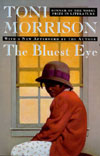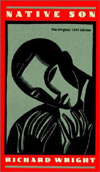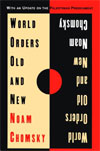The Bible
My mother used to sit with my sisters and me around her as she read to us from the Bible. Strange and dramatic sagas of Jonah and the big fish, Noah and his ark, and David and Goliath. These fed a vivid imagination. Later, when I began reading the Bible on my own, I appreciated the rich poetry of the Song of Solomon, the lyricism of Proverbs and Ecclesiastes. While the gospels are a measure of faith for some, to me the birth of Jesus was a haunting and original tale. The plaintive appeals of Paul in his letters to the Corinthians and to Timothy were surpassed by the drama of Pentecost and by the rich, mysterious imagery of Revelation. I learned from this book that words can heal when you're feeling sore in spirit, that they can make you reflective, joyful, somber. Not so much because you subscribe to a religious belief they may point to, but because they have power when put together in the right way.
My mother used to sit with my sisters and me around her as she read to us from the Bible. Strange and dramatic sagas of Jonah and the big fish, Noah and his ark, and David and Goliath. These fed a vivid imagination. Later, when I began reading the Bible on my own, I appreciated the rich poetry of the Song of Solomon, the lyricism of Proverbs and Ecclesiastes. While the gospels are a measure of faith for some, to me the birth of Jesus was a haunting and original tale. The plaintive appeals of Paul in his letters to the Corinthians and to Timothy were surpassed by the drama of Pentecost and by the rich, mysterious imagery of Revelation. I learned from this book that words can heal when you're feeling sore in spirit, that they can make you reflective, joyful, somber. Not so much because you subscribe to a religious belief they may point to, but because they have power when put together in the right way.

The Bluest Eye
By Toni Morrison
When I was an adolescent, I dreamed of being a writer. At the time, books by black writers weren't taught in the public school system. So I grew up believing that black people didn't write books. It wasn't until I entered college that I discovered The Bluest Eye. It spoke to me in a way that no other book had. Pecola Breedlove's plight was the universal plight of little black girls. You move through a world where no one appreciates your beauty, not even within your own community. Pecola's search for acceptance finally leads her into insanity. And Morrison's language is woven like poetry as she takes us with Pecola on this descent into madness. There are no polemics here, but the book is an example of how writers can be most effective. Take a simple story, tell it honestly and well, and you can touch lives.
By Toni Morrison
When I was an adolescent, I dreamed of being a writer. At the time, books by black writers weren't taught in the public school system. So I grew up believing that black people didn't write books. It wasn't until I entered college that I discovered The Bluest Eye. It spoke to me in a way that no other book had. Pecola Breedlove's plight was the universal plight of little black girls. You move through a world where no one appreciates your beauty, not even within your own community. Pecola's search for acceptance finally leads her into insanity. And Morrison's language is woven like poetry as she takes us with Pecola on this descent into madness. There are no polemics here, but the book is an example of how writers can be most effective. Take a simple story, tell it honestly and well, and you can touch lives.

Native Son
By Richard Wright
There have been only two books in my life that have made me cry—the first 50 pages of Jane Eyre and the last 50 of Native Son. Like Ann Petry's The Street and John Steinbeck's The Grapes of Wrath, Richard Wright's masterpiece is in the school of the protest novel. This is a political term for books that were critical of the social conditions in America during the 1930s and '40s. Native Son is considered a classic because it spoke to a truth that is still relevant today: diminished opportunities for young black men. In Bigger Thomas's struggle for self-worth, I saw the faces of the sons and brothers and uncles and nephews within my community. Of course, few—if any of them—would go to the violent extremes that Wright's character did, but I know they have felt his desperation at times. Native Son taught me that it's all right to have passion within your work, that you don't need to shy away from politics in order to write fiction. Everything is political, from buying a loaf of bread to looking for an apartment.
By Richard Wright
There have been only two books in my life that have made me cry—the first 50 pages of Jane Eyre and the last 50 of Native Son. Like Ann Petry's The Street and John Steinbeck's The Grapes of Wrath, Richard Wright's masterpiece is in the school of the protest novel. This is a political term for books that were critical of the social conditions in America during the 1930s and '40s. Native Son is considered a classic because it spoke to a truth that is still relevant today: diminished opportunities for young black men. In Bigger Thomas's struggle for self-worth, I saw the faces of the sons and brothers and uncles and nephews within my community. Of course, few—if any of them—would go to the violent extremes that Wright's character did, but I know they have felt his desperation at times. Native Son taught me that it's all right to have passion within your work, that you don't need to shy away from politics in order to write fiction. Everything is political, from buying a loaf of bread to looking for an apartment.

World Orders Old and New
By Noam Chomsky
Chomsky is one of the leading intellects of our time. After reading him, I was never able to look upon America in the same way again. He painstakingly goes behind the mediocre reporting of established newspapers and television to show how America, from its inception, has oppressed its citizens as well as people beyond its borders. Nothing escapes his scrutiny, from relationships between the United States and South America or Eastern Europe, to the problems in the Middle East. For anyone who has felt something was missing from the reportage she reads or sees on the evening news, this is the book to read. As a writer, I need to understand the world in which I move. It may never enter my fiction, but it's certainly the springboard from which I create.
By Noam Chomsky
Chomsky is one of the leading intellects of our time. After reading him, I was never able to look upon America in the same way again. He painstakingly goes behind the mediocre reporting of established newspapers and television to show how America, from its inception, has oppressed its citizens as well as people beyond its borders. Nothing escapes his scrutiny, from relationships between the United States and South America or Eastern Europe, to the problems in the Middle East. For anyone who has felt something was missing from the reportage she reads or sees on the evening news, this is the book to read. As a writer, I need to understand the world in which I move. It may never enter my fiction, but it's certainly the springboard from which I create.




